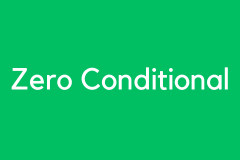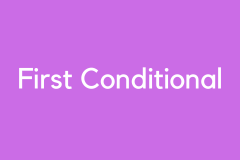First Conditional
Learn how to use the first conditional in English.
Can you answer these grammar questions correctly?
First Conditional
Point 1: The first conditional If-clause expresses the likelihood of something happening because of another action.
- If it rains, I will not go out tonight.
- If you win the next race, you will have a chance of winning gold.
- If we hurry, we can make it.
- If we get busy, I cannot meet you.
Point 2: If-clauses can start a sentence. They are followed by a comma in written English.
- If I see Mary, I will tell her the bad news.
- If we can pass these exams, we will be happy.
- If you come over, I will make you dinner.
- If it happens, it happens.
Point 3: If-clauses can follow the main clause. They do not need a comma in written English.
- I will tell Mary the bad news if I see her.
- We will be happy if we pass these exams.
- I will call you if we are late.
- We will lose if we do not try harder.
Point 4: We can use other modals instead of will, such as should, would, could, can, may, and might.
- I may tell Mary the bad news if I see her.
- If you do your homework, you can watch TV.
- You should get there on time if the traffic is not bad.
- If he does that again, I would tell the boss.










